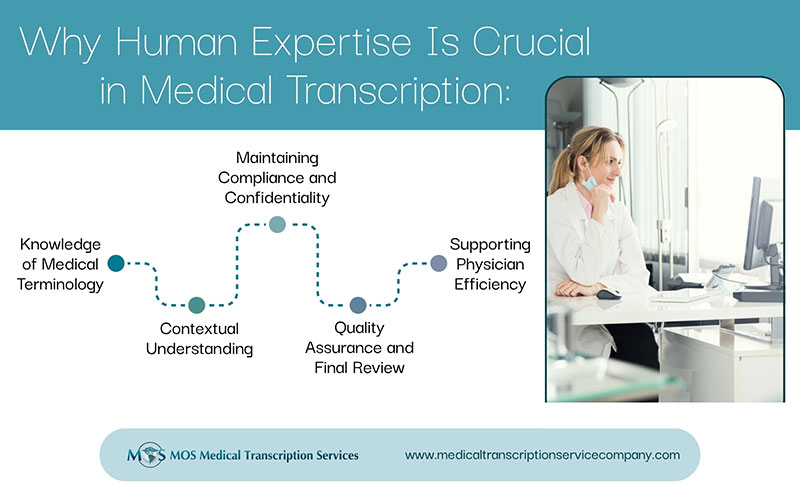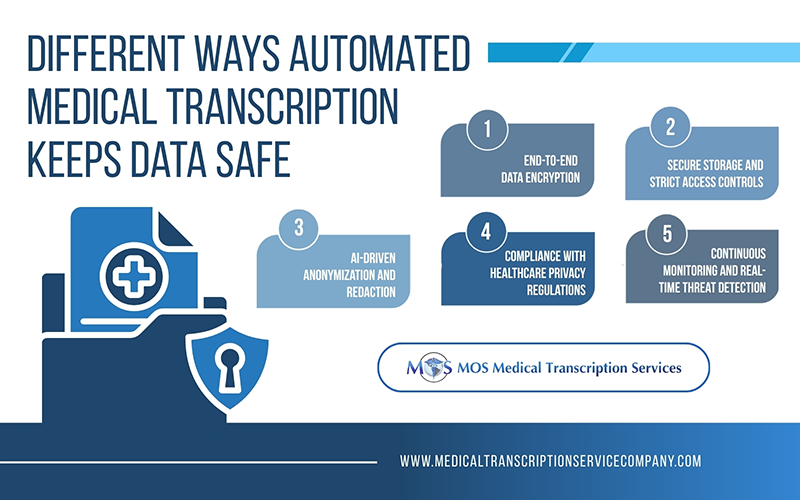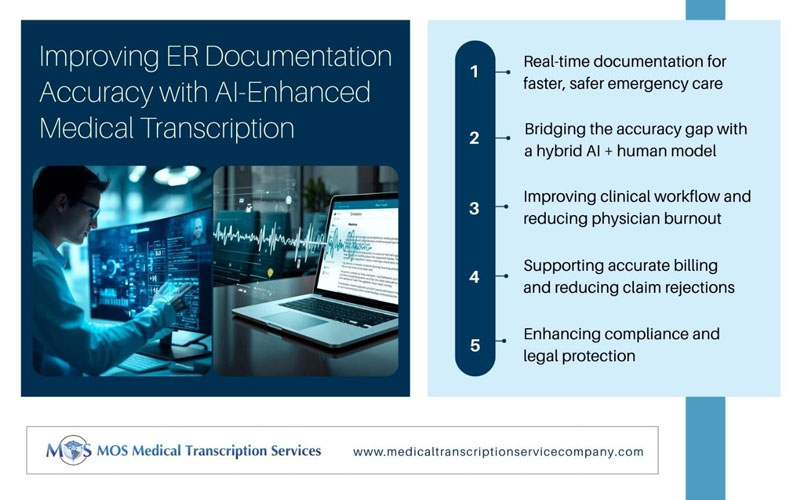Table of Contents
In recent years, the healthcare industry has witnessed remarkable technological progress, including significant advances in artificial intelligence. Despite the growing presence of automated transcription tools, human transcriptionists in healthcare remain indispensable. Their expertise, nuanced understanding of medical terminology, and ability to interpret context ensure reliability and accuracy in medical documentation. Partnering with an experienced medical transcription company is essential to get precise and contextually accurate healthcare records that automated tools alone cannot deliver.
Human vs. AI Transcription In Complex Medical Documentation
Artificial intelligence has made significant strides in healthcare, supported by speech recognition and natural language processing technologies. By automating routine tasks in the manual transcription process, AI minimizes time and efforts spent on fixing errors. Additionally, AI enables real-time and instant transcription, optimizing efficiency and resources for healthcare organizations.
However, these technologies are not infallible. Background noise, accents, speech impediments, and variations in pronunciation can all challenge AI systems. Medical reports are often complex, and depending upon specialties, filled with medical jargon, abbreviations, or multifaceted information that requires careful judgment. AI systems may misinterpret or omit such nuances, leading to inaccuracies in the final report.
These limitations restrict the ability of AI systems to produce error-free transcripts independently. Inaccurate notes can result in misdiagnoses, missed follow-ups, billing errors, or legal repercussions. Human transcriptionists serve as a critical medical transcription quality control tool, reviewing and correcting AI-generated drafts using their clinical knowledge and contextual awareness. They possess adequate training and bring in years of expertise, ensuring that the final records comply with regulatory requirements.
The Role of Human Transcriptionists in Medical Documentation
The continued reliance on human transcriptionists reflects the intricate, high-risk nature of healthcare documentation which involves more than just converting audio to text. Let’s go through the key reasons why human involvement is essential for transcription activities:
- 1. Knowledge of Medical Terminology
The transcription process deals with technical terms, acronyms, and reporting style unique to each medical specialty. A single misinterpreted term can alter the clinical meaning of an entire report. For example, a transcriber working with cardiologists must understand ECG interpretations, valve disorders, and medication protocols.
Skilled transcribers bring a depth of domain knowledge that allows them to interpret:
- Multi-specialty language variations
- Drug names and dosages
- Diagnostic abbreviations and shorthand
AI systems trained on general medical data may falter when exposed to these niche domains. Humans, on the other hand, can distinguish variations in medical terminology transcription, ensuring accurate documents that protect healthcare providers from liability.
- 2. Contextual Understanding
Another significant factor that makes experts in transcription service superior to AI systems is their ability to apply contextual understanding to clinical nuances. They can interpret dictations accurately by considering the context of the patient’s history, variations of meaning in medical jargon, and resolve ambiguities. For example, a doctor might say “no known allergies,” but if the previous section of the report lists one, a human will spot the inconsistency. In surgical dictations, human transcriptionists often fill in missing but standard procedural steps, ensuring completeness. This contextual awareness not only rectifies any errors but also safeguards the integrity of the medical record.
- 3. Maintaining Compliance and Confidentiality
Healthcare documentation is a legal record, subjected to strict compliance standards such as HIPAA. Professionals must adhere to privacy protocols and ethical standards, ensuring that confidentiality is preserved throughout the process. Trained transcribers are equipped to ensure:
- HIPAA compliance transcription practices
- Secure transfer and storage of patient data
- Proper formatting for legal documentation
While subject to privacy policies, AI systems raise privacy concerns as they are not free from data leaks or breaches. Human professionals provide an added layer of ethical responsibility and oversight that is critical in medical settings.
- 4. Quality Assurance and Final Review
Even when AI tools are used to produce transcripts, they only serve as an initial draft. If the record contains any misspelled drug names, omitted symptoms, or incorrect dosages, it can result in serious consequences. Human experts have to review and edit the output for the final document to meet professional standards.
Their responsibilities include:
- Formatting documents according to institutional protocols
- Ensuring grammatical clarity
- Cross-verifying patient identifiers, procedure names, and lab value
This combination of editorial skill and medical awareness positions human transcriptionists as the final authority in the document creation process.
- 5. Supporting Physician Efficiency
Accurate documentation is a time-consuming process as it should be structured according to templates, highlights findings, and must be free from errors. Physicians who spend time editing AI-generated notes are pulled away from patient care. Humans can reduce clerical fatigue by delivering ready-to-use reports. This not only improves usability of electronic health records but also allows providers to focus on their clinical duties.
The goal is not to resist AI but to integrate it intelligently. Many institutions are shifting toward a hybrid model, wherein:
- AI handles real-time transcription during patient encounters
- Human transcriptionists review, revise, and finalize the documents
This model enhances productivity without compromising on quality. It also allows transcriptionists to evolve in their roles, focusing on quality control, accuracy assurance, and higher-level editorial responsibilities.
Hybrid Transcription Models Combining AI and Human Expertise
As healthcare becomes more data-driven, the demand for clean, accurate, and legally sound documentation will only grow. The most effective transcription solutions combine the strengths of both human transcriptionists and AI technology. AI can accelerate the initial transcription phase by producing drafts quickly, but manual review remains necessary to correct errors and interpret complex notes accurately.
As transcription evolves into a more technology-enabled process, outsourcing to HIPAA compliant medical transcription agencies provides an effective way to support AI-human collaboration at scale. Partnering with external experts who are trained in both medical documentation and AI applications helps healthcare organizations maintain high standards of accuracy and compliance without straining internal resources. This approach ensures that skilled transcribers can focus on reviewing and refining AI-generated drafts, making documentation and overall workflow more efficient and reliable.




